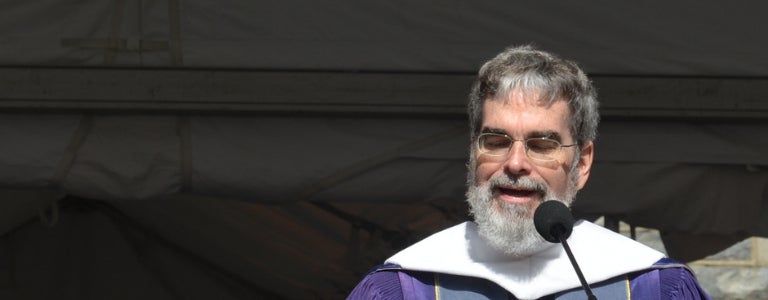A Life With Your Head in the Clouds

Brother Consolmagno at the College’s 2014 Commencement
May 12, 2014—It could be said that Guy Consolmagno, S.J., has his head in the clouds. And that’s exactly where it’s supposed to be. As the curator of the Vatican meteorite collection, it’s Brother Consolmagno’s job to study space. Particularly, he explores the connections between meteorites, asteroids, and the evolution of small bodies in the solar system.
For Brother Consolmagno, his job represents the best of all worlds. It affords him the opportunity to teach, conduct research, lecture, travel, and occasionally deliver commencement addresses. On May 17, he will give the keynote address at the College’s commencement ceremony, and he will also receive an honorary doctorate in recognition of a life in science that is dedicated to Ad majorem Dei gloriam—for the greater glory of God.
Brother Consolmagno, whose new book Would You Baptize an Extraterrestrial? will be released later this year, sat down to chat about discovering astronomy as a kid, getting sent to the Vatican, and why science and religion are not actually at odds.
What piqued your interest in astronomy?
It’s a function of my age. I started kindergarten the year the first satellite Sputnik went into orbit. I was a senior in high school when the first people landed on the moon. How could you not be space crazy?
Right, but it’s one thing to like space. It’s quite another to pursue it as a course of study.
Well, part of it was just the joy of learning about stars and then learning what their names were and getting to know them. But mostly I think it’s that sense that [astronomy] reminds you of a world that’s bigger than just yourself and your day-to-day worries. You can be part of that world in a small way by knowing the stars.
But where you stand in relation to the universe is an infinitesimal place. We’re so tiny comparatively. That’s one way to think about it. But the other way is that tiny is not the same as zero. Even knowing how big the universe is, to be able to identify it, you’ve got a way to say, “I know you, I know where I am, I know my neighborhood.”
What was it like being in the novitiate early on?
One of the astonishing things about being a Jesuit that I never expected is that in one way or another, I’ve gotten to [do] all of the things I’m interested in. So I can do science, but I can teach. I can write, which I love to do. I can give public talks. It’s astonishing that there’s one life that allows me so many opportunities.
How did you end up at the Vatican Observatory?
My grandest dream would have been to teach at Georgetown. But when you become a Jesuit, they make you take these vows. Poverty and chastity, I could deal with—I had been a grad student. Then there’s obedience. As a Jesuit, they ordered me to live in Rome, eat that terrible food, look at that boring scenery and oh yes, do all the research I could imagine doing with one of the largest meteorite collections in the world. And I had to obey. What could I do? .
So what does it mean to be the curator of the Vatican meteorite collection?
My primary responsibility is doing research with the collection. But I also have curating duties, which is this careful balance to make sure the meteorites are used well for science. But at that same time, I have to protect the collection so that it’s there for the next generation of people who want to use it.
I’m guessing most people don’t know that the Vatican has an observatory. How did it come about?
The observatory, we claim, goes back to the reform of the calendar in the 1500s and there’s a certain truth to that. But the modern incarnation dates from 1891, and Pope Leo XIII had a couple of goals. One was to show the world that the Church supported science. So it was a visible sign to show we actually think science is wonderful.
But it was political as well. It was a sign of nationhood. This was a way that the Vatican reminded people that they were independent of Italy, that they were independent of any national power, and that they could stand alongside other nations with a national observatory.
Why do you think it is that people might be surprised to know that the Vatican has an observatory?
That’s a great question—where does this idea of a war between science and religion come from? It’s not in the facts. It’s not in the history. It’s not even in the science. Part of what we’re out there to do is remind everyone else, other scientists who are religious, that you’re not alone. There are a lot of us doing this work because the joy you get out of doing science is like the joy you get in a moment of really wonderful prayer. You’re in touch with the truth and that always makes you feel fabulous.
—Lauren Ober